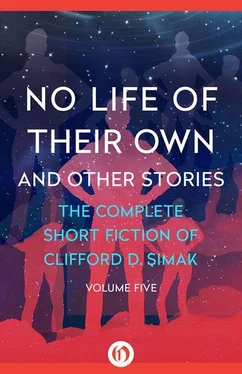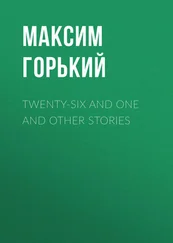The old Neanderthaler drew in his breath with a slobbering sigh. Perhaps some day they would. In the meantime, he kept close and jealous guard and maintained the proper respect to the one of them that had stayed behind, the one whose bones lay neatly arranged in one corner of the tractor.
But they had remembered One-Eye before they left, these other friends of his. Of that One-Eye was sure. Had they not left behind them, in the tractor, for him to find, the great shining stone which he had given them so long ago in exchange for the shining, keen-edged knife?
One-Eye slobbered pleasurably now as he looked at the stone, sparkling and flashing with hidden fire as it lay in the palm of his hand. One-Eye could not know that the stone had been left in the tractor accidentally, overlooked by the 20th and 56th century men before they left on their excursion into time. Not knowing this, One-Eye held close to him the thought that these friends of his had left behind a token … a token that some day, perhaps, they would return and sit around a fire with him and give him bones to gnaw and scratch his back where it itched the most.
Outside the wind howled dismally and the snow slanted down in a new fury. A blizzard raged over the Thames valley.
But One-Eye, snug in his furs, comfortable in his old age, a god to his contemporaries, played with a diamond the size of a man’s fist, unmindful of the weather.
Originally published in the July 1944 issue of Astounding Science Fiction , “Huddling Place” is one of the best-known stories in the iconic volume City. It is the seed from which all the tragedy in the remaining stories in the series springs, and it brings to life Simak’s visions of talking dogs and robots. Simak himself felt that in creating those stories, he became a mature and accomplished writer.
—dww
The drizzle sifted from the leaden skies, like smoke drifting through the bare-branched trees. It softened the hedges and hazed the outlines of the buildings and blotted out the distance. It glinted on the metallic skins of the silent robots and silvered the shoulders of the three humans listening to the intonations of the black-garbed man, who read from the book cupped between his hands.
“For I am the Resurrection and the Life—”
The moss-mellowed graven figure that reared above the door of the crypt seemed straining upward, every crystal of its yearning body reaching toward something that no one else could see. Straining, as it had strained since that day of long ago when men had chipped it from the granite to adorn the family tomb with a symbolism that had pleased the first John J. Webster in the last years he held of life.
“And whosoever liveth and believeth in Me—”
Jerome A. Webster felt his son’s fingers tighten on his arm, heard the muffled sobbing of his mother, saw the lines of robots standing rigid, heads bowed in respect to the master they had served. The master who now was going home—to the final home of all.
Numbly, Jerome A. Webster wondered if they understood—if they understood life and death—if they understood what it meant that Nelson F. Webster lay there in the casket, that a man with a book intoned words above him.
Nelson F. Webster, fourth of the line of Websters who had lived on these acres, had lived and died here, scarcely leaving, and now was going to his final rest in that place the first of them had prepared for the rest of them—for that long line of shadowy descendants who would live here and cherish the things and the ways and the life that the first John J. Webster had established.
Jerome A. Webster felt his jaw muscles tighten, felt a little tremor run across his body. For a moment his eyes burned and the casket blurred in his sight and the words the man in black was saying were one with the wind that whispered in the pines standing sentinel for the dead. Within his brain remembrance marched—remembrance of a gray-haired man stalking the hills and fields, sniffing the breeze of an early morning, standing, legs braced, before the flaring fireplace with a glass of brandy in his hand.
Pride—the pride of land and life, and the humility and greatness that quiet living breeds within a man. Contentment of casual leisure and surety of purpose. Independence of assured security, comfort of familiar surroundings, freedom of broad acres.
Thomas Webster was joggling his elbow. “Father,” he was whispering. “Father.”
The service was over. The black-garbed man had closed his book. Six robots stepped forward, lifted the casket.
Slowly the three followed the casket into the crypt, stood silently as the robots slid it into its receptacle, closed the tiny door and affixed the plate that read:
NELSON F. WEBSTER
2034–2117
That was all. Just the name and dates. And that, Jerome A. Webster found himself thinking, was enough. There was nothing else that needed to be there. That was all those others had. The ones that called the family roll—starting with William Stevens, 1920–1999. Gramp Stevens, they had called him, Webster remembered. Father of the wife of that first John J. Webster, who was here himself—1951–2020. And after him his son, Charles F. Webster, 1980–2060. And his son, John J. II, 2004–2086. Webster could remember John J. II—a grandfather who had slept beside the fire with his pipe hanging from his mouth, eternally threatening to set his whiskers aflame.
Webster’s eyes strayed to another plate. Mary Webster, the mother of the boy here at his side. And yet not a boy. He kept forgetting that Thomas was twenty now, in a week or so would be leaving for Mars, even as in his younger days he, too, had gone to Mars.
All here together, he told himself. The Websters and their wives and children. Here in death together as they had lived together, sleeping in the pride and security of bronze and marble with the pines outside and the symbolic figure above the age-greened door.
The robots were waiting, standing silently, their task fulfilled.
His mother looked at him.
“You’re head of the family now, my son,” she told him.
He reached out and hugged her close against his side. Head of the family—what was left of it. Just the three of them now. His mother and his son. And his son would be leaving soon, going out to Mars. But he would come back. Come back with a wife, perhaps, and the family would go on. The family wouldn’t stay at three. Most of the big house wouldn’t stay closed off, as it now was closed off. There had been a time when it had rung with the life of a dozen units of the family, living in their separate apartments under one big roof. That time, he knew, would come again.
The three of them turned and left the crypt, took the path back to the house, looming like a huge gray shadow in the mist.
A fire blazed in the hearth and the book lay upon his desk. Jerome A. Webster reached out and picked it up, read the title once again:
“Martian Physiology, With Especial Reference to the Brain” by Jerome A. Webster, M.D.
Thick and authoritative—the work of a lifetime. Standing almost alone in its field. Based upon the data gathered during those five plague years on Mars—years when he had labored almost day and night with his fellow colleagues of the World Committee’s medical commission, dispatched on an errand of mercy to the neighboring planet.
A tap sounded on the door.
“Come in,” he called.
The door opened and a robot glided in.
“Your whiskey, sir.”
“Thank you, Jenkins,” Webster said.
“The minister, sir,” said Jenkins, “has left.”
“Oh, yes. I presume that you took care of him.”
“I did, sir. Gave him the usual fee and offered him a drink. He refused the drink.”
Читать дальше












